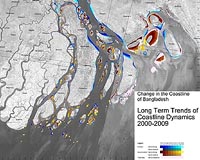| . |  |
. |
Cochabamba, Bolivia (UPI) Apr 23, 2010 Bolivian President Evo Morales, closing an international conference of grassroots climate groups, announced plans for a world people's referendum on climate change. In a Los Angeles Times editorial Friday, Morales noted that at the U.N. climate summit in Copenhagen last December developing nations "were effectively being left in the cold while a tiny group dominated by a few rich governments met in private to produce an unacceptable compromise." Morales said that's why he organized the World People's Conference on Climate Change and the Rights of Mother Earth, which convened last Tuesday-Thursday at the central Bolivian city of Cochabamba, noting that "it is time for the people to decide." More than 31,000 people from more than 140 countries attended with official representation from 48 governments, Morales said, noting that he had expected just 10,000 people in Cochabamba for the first conference of its kind. "Everyone came to work," he said, to produce concrete documents and proposals on 17 different themes related to climate change, which he referred to as "the single most important issue of our lifetime." Morales said he would take the strategies and proposals to the November U.N. climate conference in Mexico. "The United Nations has an obligation to listen to its peoples and social forces," the Bolivian president said Thursday at the conclusion of the Cochabamba conference. "If the United Nations doesn't want to lose its authority, they should apply the conclusions of this conference. And if they don't, I am convinced that the peoples will apply their wisdom, recommendations and documents." Proposals agreed upon at the conference include the creation of a multilateral organization to manage environmental issues, protection for climate migrants, a ban on privatizing knowledge and the fullest respect for the rights and freedoms of indigenous peoples, states the final document. Conference participants stated their opposition to carbon compensation schemes, carbon trading and other profit-based financial mechanisms, saying these were irrelevant to the real solution. The conference's final document also calls for the elimination of all new forms of colonialism and for rich countries to follow a new phase of commitment to real reductions in greenhouse gas emissions within the framework of the Kyoto Protocol. "Developed countries should take very seriously what happened here," said Angelica Navarro, Bolivian ambassador to the United Nations, The Guardian reports. "This is real democracy. We are trying to bring a solution onto the negotiations table, coming from the people from people that are really suffering, that are at the forefront of the battle, it will be a mistake not to hear their own people."
Share This Article With Planet Earth
Related Links Climate Science News - Modeling, Mitigation Adaptation
 Study challenges IPCC's Bangladesh climate predictions
Study challenges IPCC's Bangladesh climate predictionsDhaka (AFP) April 22, 2010 Scientists in Bangladesh posed a fresh challenge to the UN's top climate change panel Thursday, saying its doomsday forecasts for the country in the body's landmark 2007 report were overblown. The Intergovernmental Panel on Climate Change (IPCC), already under fire for errors in the 2007 report, had said a one-metre (three-foot) rise in sea levels would flood 17 percent of Bangladesh and cre ... read more |
|
| The content herein, unless otherwise known to be public domain, are Copyright 1995-2010 - SpaceDaily. AFP and UPI Wire Stories are copyright Agence France-Presse and United Press International. ESA Portal Reports are copyright European Space Agency. All NASA sourced material is public domain. Additional copyrights may apply in whole or part to other bona fide parties. Advertising does not imply endorsement,agreement or approval of any opinions, statements or information provided by SpaceDaily on any Web page published or hosted by SpaceDaily. Privacy Statement |